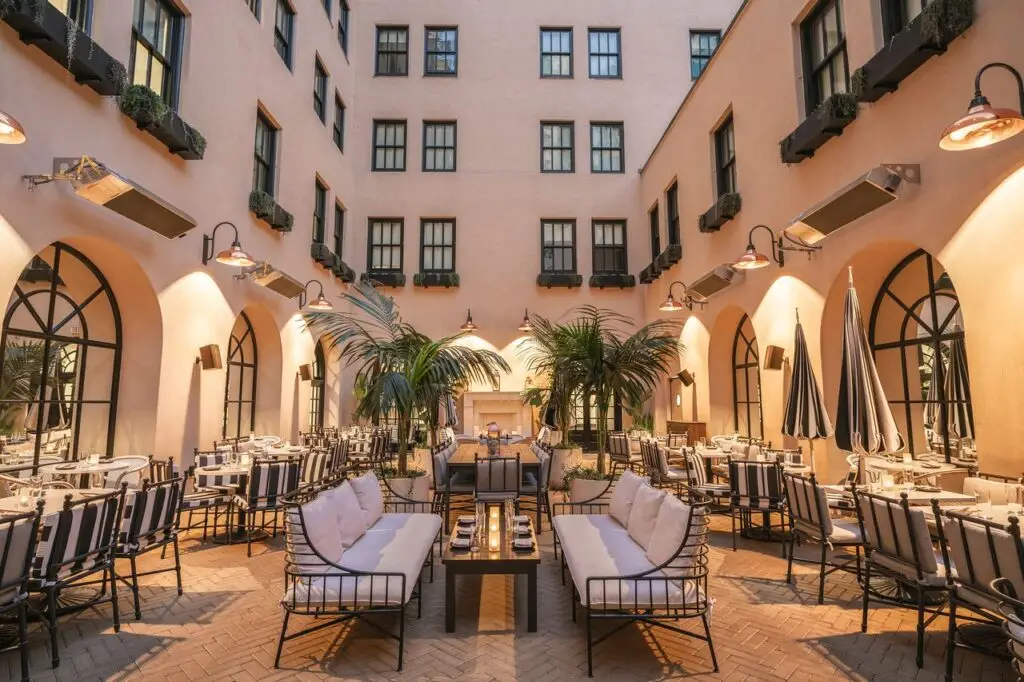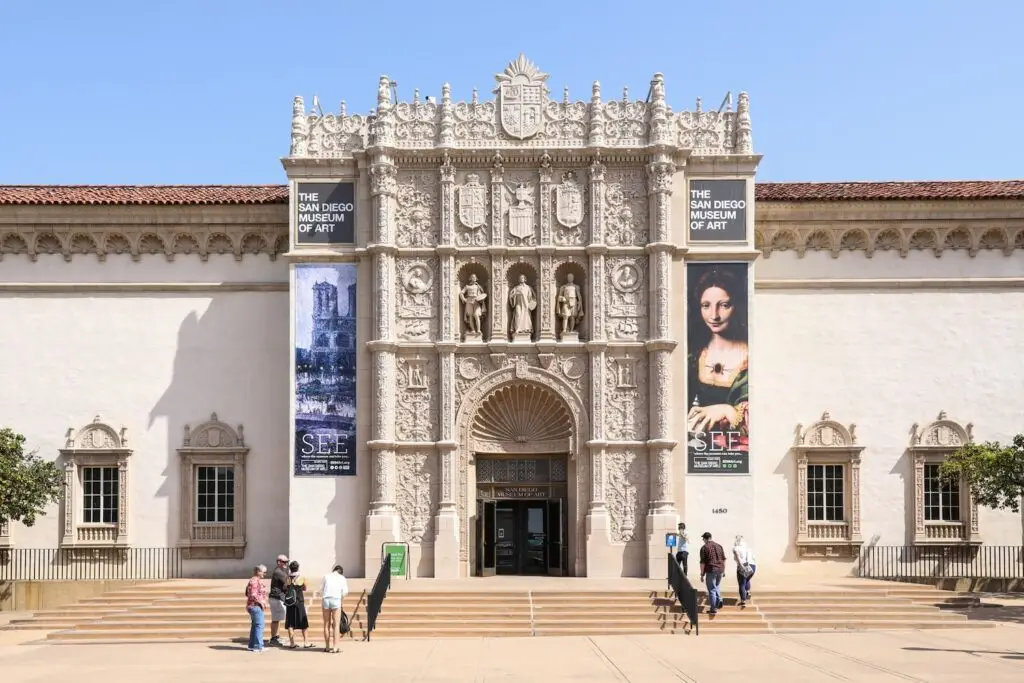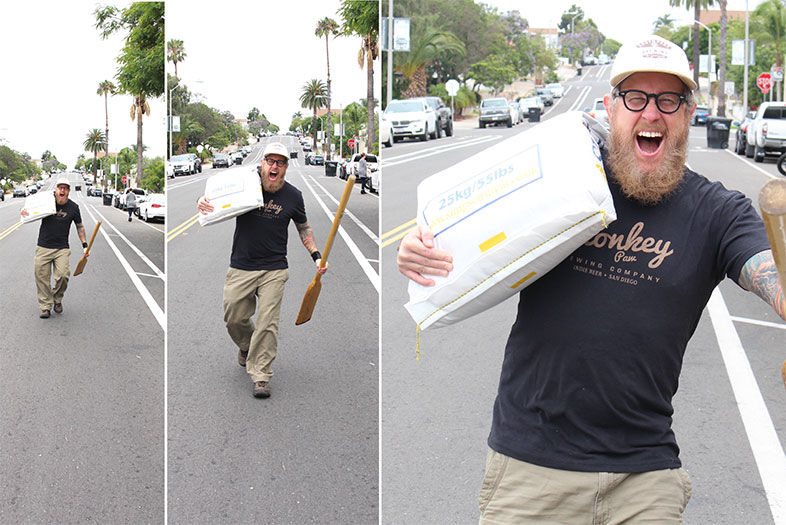Anyone who’s met Scot Blair knows that he’s not one to mince words. He’s unabashedly opinionated, ruthlessly direct, and can frequently come off as righteously self-assured. But those who truly know him also know that the bluster is borne of a true passion for the craft of brewing and true conviction about what great beer is.
For more than a decade, Blair has been on the front lines of the San Diego craft beer scene. He was one of the beer community’s earliest supporters, promoting local beer and touting its quality from the moment he opened Hamilton’s Tavern in 2005. Since that time, he’s opened numerous other venues, including two brewery-pubs (Monkey Paw and South Park Brewing Company). At no time during the past dozen years or so has Blair’s enthusiasm for craft beer waned. In fact, he has found himself many times at the forefront of San Diego’s most contentious debates, most recently fighting what he sees as the destructive invasion of Big Beer into the local scene.
I sat down with Blair one morning in South Park, chatting as he monitored the progress of a smoked ale he was creating with his brewer Ryan Traylor.
You’ve recently taken on more of the hands-on responsibility for brewing here at South Park. How is that working out?
Realistically, I built this place so I could brew. I started brewing in 1995, so I’ve been brewing for a long time. I’ve done hundreds and hundreds of brews and it’s always been a passion. When I opened up Monkey Paw, I developed all those first beers, brewing alongside Derek [Freese]. The intent of these places was always for me to be the head brewer, but not always doing the nuts and bolts of everything.
I need other people to do a lot of the legwork, because running all the businesses as I do, I’m hands on with everything—from the food specials that we’re doing to picking the beers at Hamilton’s, to the events. I wanted to open the breweries so I could have an outlet to express myself in brewing. But I also wanted to have it be an outlet to empower other people to find their dream.
Derek was working at Sony before he started brewing with me. Cosimo [Sorrentino] was bussing tables when I gave him an opportunity to start brewing. And now what I get to do is mentor these young exciting kids I have working for me. The future is theirs. And I get to be part of that and I take it very, very, very seriously.
You’ve spent a long time being one of the most influential arbiters of what good craft beer is in this town. Did you have any fear or anxiety about putting your own beers out there, opening yourself and your beers to potential criticism, or did you feel more like it was an opportunity to show people what you thought good beer was all about?
Well, I knew that potential criticism would come along with it, but I didn’t really feel any pressure. I’m a master of my craft—I know people might think that’s bragging, but I’m good at what I do. Beer is what I do. I’m good at drinking it. I’m good at curating it. I’m good at finding the next thing that I think is important. And I’m good at brewing it. And I know that attitude might rub people the wrong way, but it’s not hubris. I’m fallible. I’ve made some shitty beer. And we’ve made a lot of mistakes at Hamilton’s, but I tried to learn from mistakes. And this is my life. I want to be the best that I can be at it. So, I knew that there would be haters, but they actually fuel me.
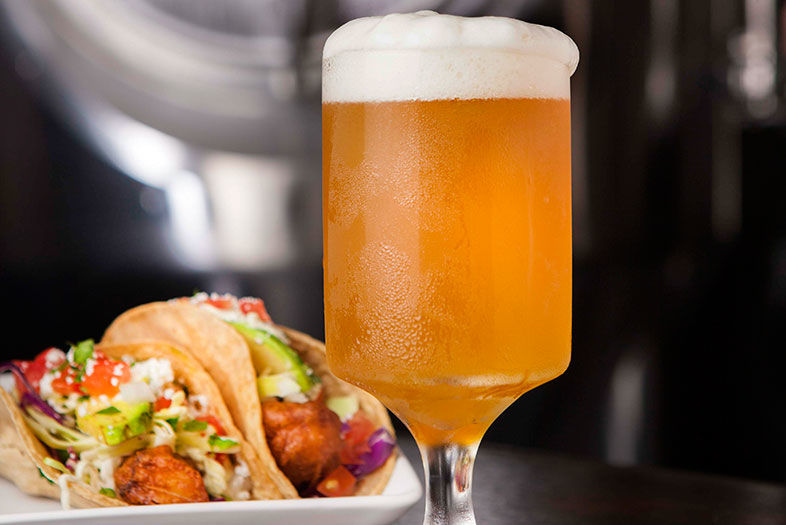
Have a Beer with Publican, Activist, and Brewer Scot Blair
South Park Brewing Company offers an impressive range of both Old World and New World styles. | Photo: Bruce Glassman
You have long and deep relationships with just about every great brewer in this town. Were you at all nervous about how they would receive your beers?
No. Because a lot of those guys drank my homebrew, and a lot of those guys have big egos, and they’re not afraid of calling me on my bullshit. Those are true friends and I deeply respect all their input. Actually, to be honest, a lot of them were really happy that we were doing as well as we were. They saw how happy I was to be able to make beer, and because I was always their biggest supporter—you know, the Chuck Silvas, the Colby Chandlers—they’ve also been my heroes. And they’ve just been really happy that I’m doing well. But there’s a lot of better beer still to be made. We haven’t even made anything close to our best beer yet. All the beers that have done fairly well on the competition circuit this year can all be better. And they will.
You just won—what?—12 medals between L.A. and the San Diego International competition?
In between L.A., San Diego, and the California State Fair, we won and were part of a total of 12 medals—actually 13 and an Honorable Mention if you count Monkey Paw. Two were collaborations that we did here—and we won gold, we won silver, we won bronze; all over seven or eight different styles of beer. So there was no “one trick pony” and they were very competitive categories, too. That’s the most in one given year that we’ve ever done. In one single year, it massively eclipses anything that we’ve done prior, which is just very humbling. And, coming in to these competitions, I had a big chip on my shoulder—you know, because the industry is getting really weird…
What’s weird?
I mean, what is beer these days? What is it? Is it everything-chocolate-adjunct stout? Is everything a hazy beer released in a can every week? It’s all just a different way to attract flies. I think we have more beer drinkers, but we have less educated beer drinkers than we ever had. And all breweries are trying to find a way to get a piece of that—that small little pie. And then Big Beer is playing its games and trying to confuse it even more. I want to get back to just high-quality pub brewing. I want to get back to not caring about “the blogger”—in fact, I never have. I never cared about all the beer fans, all the Beer Advocate fans. I cared about the people who didn’t know beer—and I still do.
What did you learn from your experience running Hamilton’s, curating that beer list, with all of the beers you taste, and seeing what people drink and what they like? How did that experience and insight influence what you wanted to brew?
That’s a really good question, and the answer may be too complex to answer here. But I’ve never paid attention to what the people are drinking. I’ve always paid attention to what I want to bring to people and how I wanted to educate them. I’m a man of the people. I’m a populist. So, I’ve always believed that my job as a publican has always been for me to bring the people what they don’t know they want. So, I have to be the expert, and I approach the brewing from that same standpoint.
In that way you’re really providing a service to people.
Yes! That’s what a publican is! And I’m not doing anything that’s too innovative on that front. I’m taking the same foundations that I learned from being a patron at O’Brien’s Pub all these years and applying it in my own way. Innovate, don’t imitate; that’s what I always say. And when I think about a beer, I think about whether I have a good lineup, if there’s something for everybody, is there a young brewery I can support who needs my money, and do they have values that are in line with mine.
There are a lot of breweries that just want to be a T-shirt merchandiser—they’re not who I’m going out there and trying to support. That’s how it is, I always try to be a partner with other brewing companies and try to see how I can help them and help promote them. I think if you talk to someone who really knows me, they’ll tell you that there isn’t a person in this industry who cares more than I do. I’m just a little outspoken, and if you believe in beer as much as I do, and you believe in the underdog, well, then, you better fear the underdog. Because the underdog will always win—because we’ll win the hearts. And I’d rather have a hundred die-hard fans than three million fan boys who don’t understand the concept of what we’re trying to do.
So some of what you’ve developed in your brewing program—like the gruits and the other styles that most people don’t know but are excited to discover and explore—that falls into your idea of bringing people what they don’t know they want, right?
Exactly. I mean, you hit the nail right on the head. Gruits, for example, can be medicinal, and they often use these ancient, outdated herbs. So I think about how to make it fresh and innovative again. Let’s make a spring time one. Let’s make something that’s a little more approachable and drinkable. Let’s make a New World-Old World gruit. And let’s educate people on something that they’ve never had. I’m doing a lot of Old World styles, but that’s not something that’s unique to me. I’m learning from Jeff Bagby and Tomme Arthur, and the guys who were doing it, learning from the Old School. They brought all those beers to my recognition. Like Dunkelweizen. People don’t go wild for Dunkels, but when you make one that’s really, really good, it improves your foundation as a brewer.
And it improves your patron base because they’re discovering beers they didn’t even know they liked, correct?
Yup. Exactly.
Alright, you’re not into the fads and you’re not into following what people consider to be “cool” and “hip,” and you’ve raged against the hazy fan boys, but here I am right now drinking an excellent hazy Vermont-style pale ale. What made you give in to that?
Because I’m a hypocrite! I’m a f**king hypocrite! I still think it’s a gimmick beer, but I did it because I feel that there’s a lot of bad beer being made in this style, and I understand the style. I mean, we don’t filter or fine any of our beers, so most of our beers are hazy when they come out of the tanks. It was the lack of execution that kind of pissed me off. So I thought if people are going to be making them, we better make one that’s the best, or at least as good as anybody else’s. Apparently it is, because it won gold at the California State Fair!
To be honest, I learned a lot about this beer from my friend Dan Drayne at Half Door, who is—I feel—an aficionado on this style. Talking to him about all the processes is almost a Ph.D level lecture. He was really instrumental in helping me understand this beer better than I had. And I’m okay with these beers, but I won’t buy one just because it’s hazy. I won’t say, “Do you have a hazy beer?”
In fact, I don’t even like that term—I think it’s offensive to the craftsmen that have been brewing for thousands of years. I think we shouldn’t buy with our eyes or with what other people tell us is good; we should buy with flavor. People are out there buying a beer just because it’s cloudy, and that’s just absurd. If you’re truly a fan of beer, you should be thinking about whether you’re drinking local first, small beer first, independent beer first, and also if you’re drinking GOOD beer first.
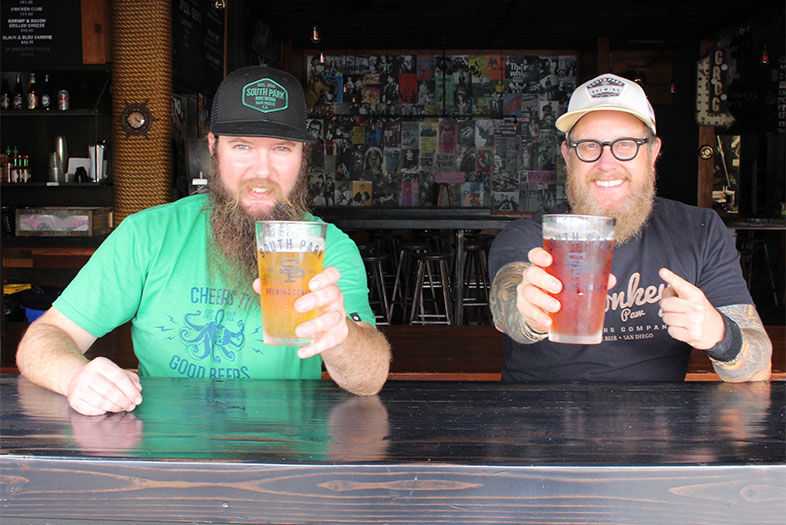
Have a Beer with Publican, Activist, and Brewer Scot Blair
Blair and brewer Ryan Traylor work together to create the SPBC beer lineup. | Photo: Bruce Glassman
You have a uniquely super overview of the beer scene here in San Diego. What are the major issues that concern you the most right now?
I’ll put them into bullet phrases: Oversaturation. Hype to fleece. Obfuscation. Inexperience. Hubris. And short-term memory.
You feel there are too many folks in town who are looking purely at brewing from a financial angle and who aren’t truly passionate about beer?
Or knowledgeable. Yes.
Obfuscation?
Big Beer buying all this shit out, trying to make it local. That’s a big problem and it’s confusing people.
How do we fight that?
Education. We have to train people. Pure and simple. Big Beer is ruining our industry. People being complacent is ruining our industry and we seem to be looking for ways to dumb down our craft. We missed an opportunity, I believe. We were on the cusp of a true renaissance, but we haven’t handled the growth. We haven’t been happy growing small.
So tell me a couple of things that you think are great about San Diego beer today.
We still have a very giving industry that can share resources; it’s a community that is okay—in certain groups—with sharing tips and techniques and wants to encourage the idea of better beer. I believe we still have some of the most passionate fans in America, when it comes to craft beer, even though it seems like there may be some consumer fatigue and it’s getting a little overwhelming. Too many choices, too many places, not enough quality places.
But, even though that’s happening, I still think we have the best, most passionate fans of beer in the whole world. I feel like there’s a small scene that’s growing around us—and it’s very, very, very small—but it’s happening. Young entrepreneurs opening breweries and putting the beer and the end customer first, and putting their retail partners first. That’s happening and I see it. It’s not a lot, but it’s like a quiet renaissance inside a saturated workspace.
Probably the most exciting thing is that in a few years a whole new generation of brewers will be brewing. I’m happy for the kids that I’ve been mentoring right now, because they are the future. My assistant, who I have been mentoring since December (Ryan Traylor); he’s being groomed to take over. So I can go away at some point. He’s my cellarman. He makes sure that everything’s happening when I’m not here. And he works his ass off and he’s earned everything.
And every one of those medals that we’ve won (and will continue to win) are equal parts his and equal parts my managers’, and equal parts my team here. Because I truly believe, at the end of the day, it really is about us and not me. And that’s the part that a lot of people don’t know about me. It’s what I preach to these guys and it’s what I really, truly believe.
BREAKING NEWS: Coronado Brewing and Monkey Paw announced on Tuesday that they have entered into a partnership that will enable Monkey Paw to greatly expand production and distribution through Coronado’s sales network. The partnership will be beneficial for both brands and will allow Blair to retain creative brewing freedom. “I feel unbelievably lucky to be able to lean on 21+ years of pioneering leadership to move Monkey Paw up and into the future,” says Blair.
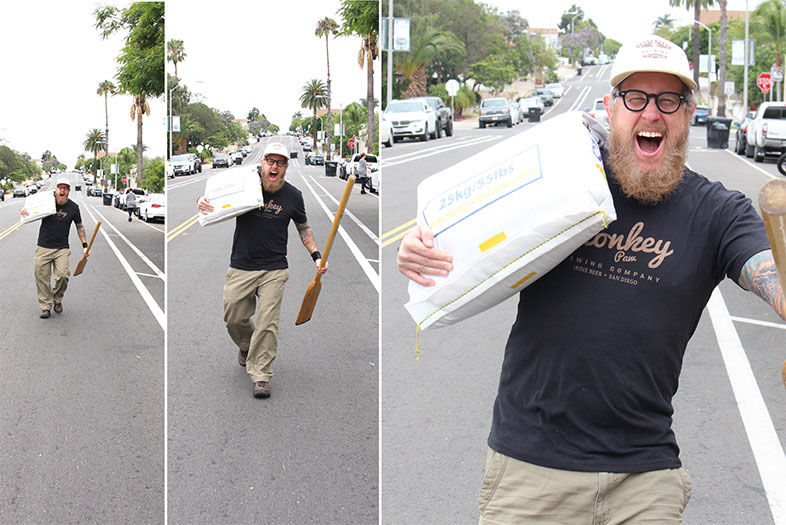
Have a Beer with Publican, Activist, and Brewer Scot Blair
PARTNER CONTENT
Scot Blair is a brewer for the people. | Photo: Bruce Glassman

